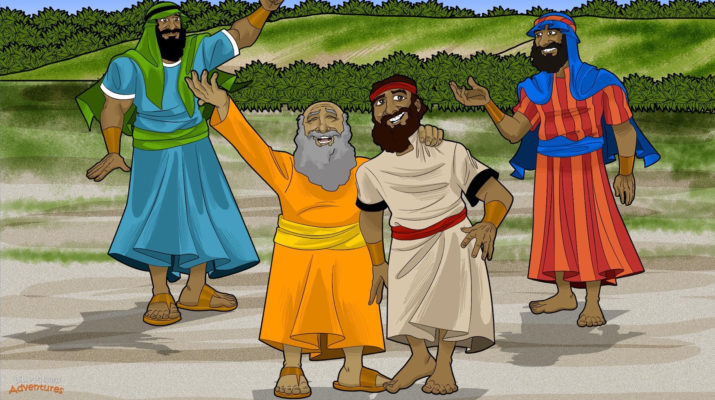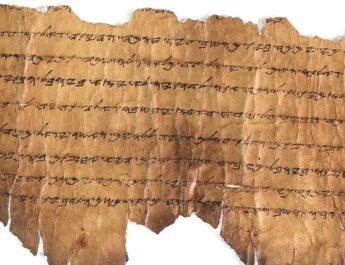Genesis 5
BibleHub
1 This is the listA of the descendantsB of Adam.C
Notes on verse 1a
A “list” = sepher. Perhaps from saphar (to tally or record something; to enumerate, recount, number, celebrate, or declare). This is can be writing itself or something that is written like a document, book, letter, evidence, bill, scroll, or register.
B “descendants” = toledoth. From yalad (to bear, bring forth; can mean to act as midwife or to show one’s lineage). This is generations descent, family, or history.
C “Adam” = Adam. 10x in OT. From the same as adam (human, humankind, ruddy); from adam (to be red, red in the face). This is Adam, the name, and also a city.
WhenD GodE createdF humankind,G he madeH them in the likenessI of God.
Notes on verse 1b
D “when” = yom. Literally “in the day.”
E “God” = Elohim.
F “created” = bara. This is to create, shape, choose, or select. It is the word used in Genesis 1:1 when God created the heavens and the earth.
G “humankind” = adam. Related to “Adam” in v1. See note C above.
H “made” = asah. This is to make, do, act, appoint, become in many senses.
I “likeness” = demuth. From damah (to resemble, liken, compare, consider, think). This is likeness, figure, model, shape, manner, or pattern. It is the same word used in Genesis 1:26, “let us make humankind in our image, according to our likeness.”
2 MaleJ and femaleK he created them, and he blessedL them and namedM them “Humankind” when they were created.
Notes on verse 2
J “male” = zakar. From zakar (to remember, to mark something so that it can be recalled, to be mindful of, to mention). This is male. Properly, perhaps, it means one who is remembered, which is to say a male.
K “female” = neqebah. From naqab (to pierce, bore holes, puncture; to make a hole more or less forcefully; also to curse or libel). This is female or woman from an anatomical reference.
L “blessed” = barak. This is to kneel, to bless. It is blessing God as part of worship and adoration or blessing humans to help them. It can be used as a euphemism to say curse God.
M “named” = qara + et + shem. Literally “called their name.” Qara is to call or call out – to call someone by name. Also used more broadly for calling forth. Shem may be from sum (to put, place, set). This is name, fame, renown. A name was thought to indicate something essential about a person – something about their individuality. So, this word can also mean honor, authority, or character.
3 When Adam had livedN one hundredO thirtyP years, he became the father ofQ a son in his likeness, according to his image,R and named him Seth.S
Notes on verse 3
N “lived” = chayah. This is to live or keep alive in a literal or figurative sense. So, it an be revive, nourish, or save.
O “hundred” = meah. This is hundred or some numbers of times one hundred (i.e. hundredfold or the base of two hundred, three hundred, etc.).
P “thirty” = sheloshim. From the same as shalosh (three, fork, triad). This is thirty or thirtieth.
Q “became the father of” = yalad. Related to “descendants” in v1. See note B above.
R “image” = tselem. 17x in OT. Root may mean to shade. This is a phantom, resemblance, illusion, image, or an idol. It is the same word used in Genesis 1:26, “let us make humankind in our image, according to our likeness.”
S “Seth” = Sheth. 8x in OT. From shith (to place, set, bring, appoint, consider, bring, array or look). This is Seth or Sheth, meaning “put” or “substituted.”
4 The days of Adam after he became the father of Seth were eightT hundred years; and he hadU other sonsV and daughters.W
Notes on verse 4
T “eight” = shemoneh. Perhaps from shamen (to shine, which implies being oily, growing fat); from shaman (to grow fat, shine, be oily). This is eight or eighth. It can refer to abundance as being more than 7, the number of sacred fullness.
U “had” = yalad. Same as “became the father of” in v 3. See note Q above.
V “sons” = ben. This is son, age, child. It is son in a literal or figurative sense.
W “daughters” = bat. Related to “sons” in v4. From ben (see note V above). This is daughter in a literal or figurative sense.
5 Thus all the days that Adam livedX were nineY hundred thirty years; and he died.Z
Notes on verse 5
X “lived” = chay. Related to “lived” in v3. From chayah (see note N above). This is alive, living, lifetime. It can also be used to describe someone’s age. It can refer to animals, plants, water, or a company or congregation of people. It is life in a very broad sense.
Y “nine” = tesha. Perhaps from sha’ah (to gaze at, gaze around, regard – to look to, especially for help; to consider or be compassionate; to look at in amazement or while confounded). This is nine, perhaps as looking to the next number associated with fullness (10).
Z “died” = mut. This is to die in a literal or figurative sense. It can also refer to being a dead body.
6 When Seth had lived one hundred five years, he became the father of Enosh.AA 7 Seth lived after the birth of Enosh eight hundred sevenBB years, and had other sons and daughters. 8 Thus all the days of Seth were nine hundred twelveCC years; and he died.
9 When Enosh had lived ninetyDD years, he became the father of Kenan.EE 10 Enosh lived after the birth of Kenan eight hundred fifteen years, and had other sons and daughters. 11 Thus all the days of Enosh were nine hundred five years; and he died.
Notes on verses 6-11
AA “Enosh” = Enosh. 7x in OT. Perhaps from enosh (human, humankind, mortal); from anash (to be weak, sick, or frail). This is Enosh, meaning “man.
BB “seven” = sheba. This is seven or by sevenfold. It can also be used to imply a week or an indefinite number. Symbolically, this is the number of fullness, sacredness, perfection.
CC “twelve” = shenayim + asar. Shenayim is from sheni (double, again, another, second); from shanah (to fold, repeat, double, alter, or disguise). This is two, both, second, couple. Asar is ten or tenth. It can also be the suffix -teen.
DD “ninety” = tishim. Related to “nine” in v5. From the same as tesha (see note Y above). This is ninety.
EE “Kenan” = Qenan. 6x in OT. From the same as qayin (spear); {from qun (to chant a lament, to play a musical note)} OR from the same as qen (a nest, room, dwelling, nestlings); {from qaanan (to nest, nestle – to make or be in a nest)}. This is Qenan, Kenan, or Cainan, meaning “fixed.”
12 When Kenan had lived seventyFF years, he became the father of Mahalalel.GG 13 Kenan lived after the birth of Mahalalel eight hundred and fortyHH years, and had other sons and daughters. 14 Thus all the days of Kenan were nine hundred and ten years; and he died.
15 When Mahalalel had lived sixtyII-five years, he became the father of Jared.JJ 16 Mahalalel lived after the birth of Jared eight hundred thirty years, and had other sons and daughters. 17 Thus all the days of Mahalalel were eight hundred ninety-five years; and he died.
18 When Jared had lived one hundred sixty-two years he became the father of Enoch.KK 19 Jared lived after the birth of Enoch eight hundred years, and had other sons and daughters. 20 Thus all the days of Jared were nine hundred sixty-two years; and he died.
Notes on verses 12-20
FF “seventy” = shibim. Related to “seven” in v7. From sheba (see note BB above). This is seventy.
GG “Mahalalel” = Mahalalel. Related to “God” in v1. 7x in OT. From mahalal (praise, fame); {from halal (to praise, be boastful, shine, celebrate)} + el (see note E above). This is Mahalalel, meaning “praise of God.”
HH “forty” = arbaim. From the same as arba (four); from raba (to make square or be four-sided). This is forty.
II “sixty” = shishshim. From the same as shesh (six, sixth; symbolic for a surplus since five fingers is a handful – one more is abundance). This is sixty.
JJ “Jared” = Yered. 7x in OT. From yarad (to go down, descend; going down in a literal or figurative sense; going to the shore or a boundary, bringing down an enemy). This is Jared, Jered, or Yered, meaning “a descent.”
KK “Enoch” = Chanoch. 16x in OT. From the same as chek (chamber or room that is private; can mean the innermost chamber of a house); probably from chanak (to narrow; to dedicate, initiate, train, or discipline). This is Enoch or Hanoch, which probably means “initiated.”
21 When Enoch had lived sixty-five years, he became the father of Methuselah.LL 22 Enoch walkedMM with God after the birth of Methuselah threeNN hundred years, and had other sons and daughters. 23 Thus all the days of Enoch were three hundred sixty-five years. 24 Enoch walked with God; then he was no more, because God took him.
25 When Methuselah had lived one hundred eightyOO-seven years, he became the father of Lamech.PP 26 Methuselah lived after the birth of Lamech seven hundred eighty-two years, and had other sons and daughters. 27 Thus all the days of Methuselah were nine hundred sixty-nine years; and he died.
Notes on verses 21-27
LL “Methuselah” = Methushelach. 6x in OT. Perhaps from math (a man, associate, friend, number; an adult or mortal); {from mathay (when, how, length of time)} + shelach (a weapon, spear, defense, plant, shoot, branch, missile); {from shalach (to send, send for, forsake, give a slave freedom)}. This is Methuselah, perhaps meaning, “man of the dart.”
MM “walked” = halak. This is go, come, walk. It is walk literally and figuratively and includes people and animals. It can be used figuratively for one’s moral life – how we walk according to God’s way or against it. It can also refer to the walk of life as in the course one’s life takes, the choices we make, etc.
NN “three” = shalosh. Related to “thirty” in v3. See note P above.
OO “eighty” = shemonim. Related to “eight” in v4. From the same as shemoneh (see note T above). This is eighty.
PP “Lamech” = Lemek. 11x in OT. Perhaps from l- (to, for, of) + muk or makak (be low, humiliate, go down). OR from an unknown root meaning to be robust. This is Lamech. It may mean “for lowering” or “for humiliation.”. Alternately, it could be “strong man.” https://www.abarim-publications.com/Meaning/Lamech.html
28 When Lamech had lived one hundred eighty-two years, he became the father of a son; 29 he named him Noah,QQ saying, “Out of the groundRR that the LordSS has cursed this one shall bring us reliefTT from our workUU and from the toilVV of our hands.”WW 30 Lamech lived after the birth of Noah five hundred ninety-five years, and had other sons and daughters. 31 Thus all the days of Lamech were seven hundred seventy-seven years; and he died.
Notes on verses 28-31
QQ “Noah” = Noach. From nuach (to rest, calm, camp, free, place, remain, satisfy, settle, station, or wait; implies settling down in a literal or figurative sense). This is Noah or Noach, meaning rest.
RR “ground” = adamah. Related to “Adam” and “humankind” in v1. From the same as adam (see note C above). This is ground, earth, soil as red, or land.
SS “Lord” = YHVH. From havah (to be, become) or hayah (to come to pass, become, be). This is the name of the God of Israel, the self-existent and eternal one, the tetragrammaton. This pronunciation has been lost to time so “Lord” is generally used in its place.
TT “bring…relief” = nacham. Properly, this is a strong breath or a sigh. This can be to be sorry, to pity, console. Comfort, or repent. But, one can also comfort oneself with less righteous thoughts, so this can also mean to avenge oneself.
UU “work” = maaseh. Related to “made” in v1. From asah (see note H above). This is a word – any action whether positive or negative. It can also be a transaction, construction, activity, property, or something that is produced.
VV “toil” = itstsabon. 3x in OT– used of Eve’s curse of pangs in childbearing and of Adam’s curse of toil in his labor in Genesis 3; also in Genesis 5:29 of the relief that Noah will bring from the toil of humanity’s hands. From atsab (to hurt, grieve, displease; to carve, make, worry). This is pain, toil, or labor.
WW “hands” = yad. This is hand, ability, power. Hand in a literal sense, but also what one can do or the means by which one does it.
32 After Noah was five hundred years old, Noah became the father of Shem,XX Ham,YY and Japheth.ZZ
Notes on verse 32
XX “Shem” = Shem. Related to “named” in v2. 17x in OT. From the same as shem (see note M above). This is Shem, meaning, “name.”
YY “Ham” = Cham. 16x in OT. Perhaps from cham (hot, warm); from chamam (to be warm, heat; to be hot in a literal or figurative sense; to mate). This is Ham, meaning “hot” or “protective wall.” See https://www.abarim-publications.com/Meaning/Ham.html
ZZ “Japheth” = Yepheth. 11x in OT. From pathah (to be simple, entice, persuade, be silly); from pethi (simple, silly, foolish, able to be deceived); from pathah (to be wide, senlarge, persuade, make roomy, to be simple, delude). This is Japheth or Yepheth, meaning “expansion.”
Image credit: “The Great Flood” by Curtis and Pip Reid of Bible Pathway Adventures.




